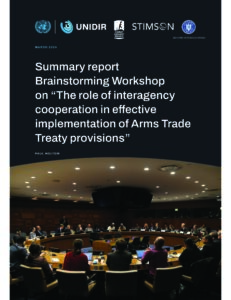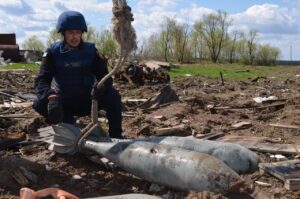The Challenge
The international trade in conventional weapons is a multi-billion-dollar industry and a significant tool of foreign policy. Yet, irresponsible and unregulated arms transfers can have a devastating toll on human lives and livelihoods, contributing to violent crime, armed conflict, and the displacement of people, as well as human rights abuses and terrorism. The consequences of the unfettered global arms trade can undermine security, stability, and sustainable development. From small arms and light weapons to combat aircraft and warships, managing how conventional weapons are transferred or employed is vital in determining the course of global conflicts as well as humanitarian and human rights efforts.
Until 2013, no global controls existed to regulate the international arms trade. That year, countries adopted the Arms Trade Treaty (ATT), the world’s first legally-binding international treaty to regulate the cross-border trade of conventional weapons. The ATT aims to reduce human suffering and promote cooperation, transparency, and responsible action in the international arms trade by establishing common standards for regulating conventional arms transfers. The ATT’s long-term success rests on effective implementation of the treaty’s obligations.
“The Center has developed highly sought-after resources to bring greater clarity to the global arms trade and promote effective ATT implementation.”
Our Approach
Stimson’s work focuses on supporting successful implementation of the ATT. Drawing on Stimson expert Rachel Stohl’s expertise as the consultant to the ATT process, Stimson established the Arms Trade Treaty-Baseline Assessment Project (ATT-BAP) in 2013 to help foster effective implementation. ATT-BAP provides clear guidance on the ATT’s provisions, helps countries identify capacity and resource needs, and assists countries that are party to the treaty in fulfilling their reporting obligations. Stimson provides hands-on training to governments and engages with civil society and industry partners, to support global implementation efforts. Stimson has produced analytical reports assessing ATT implementation, developed online guidance and training packages, and supported the ATT infrastructure using interactive tools and resources.
Our Impact
Stimson has established itself as a go-to source of information on ATT implementation and reporting. The Center has developed highly sought-after resources to bring greater clarity to the global arms trade and promote effective ATT implementation. ATT-BAP has worked with key government partners from every region, with the United Nations, with U.N. Regional Centers, and with civil society organizations to provide guidance on how to fulfill treaty reporting requirements as well as offered continued analysis on current implementation efforts. Stimson has conducted in person trainings in the Caribbean, Pacific, Africa, and Europe.
Through its research and analysis on this issue, the ATT-BAP project has established a reputation as a reliable and valuable partner and an important source of information on ATT reporting and implementation, and has ultimately contributed to broader efforts to shed more light on the historically shadowy world of global arms dealings.




